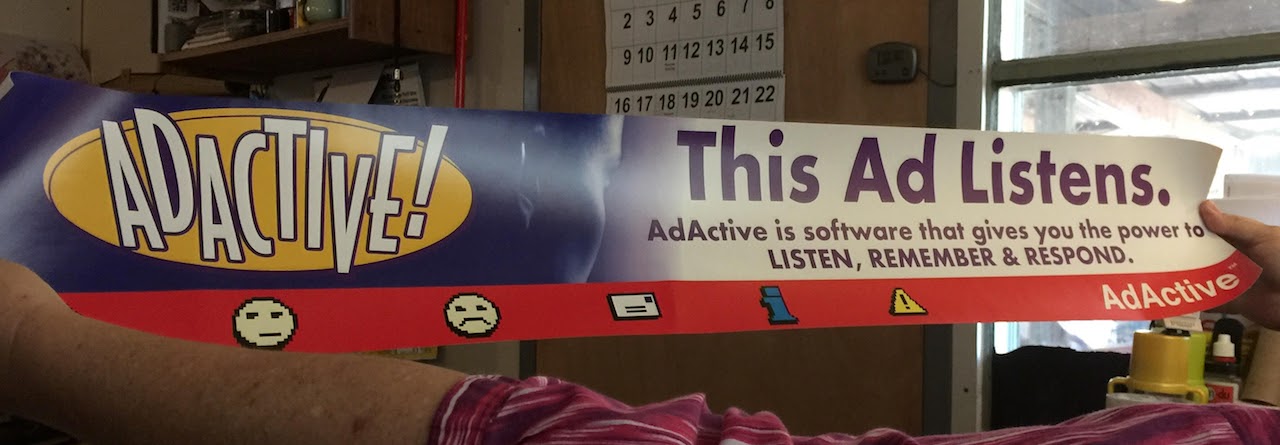In 2022, the top three most advertised drugs on US TV were: Rinvoq, Dupixent and Skyrizi. Which got me thinking about how pharmaceutical companies come up with names for new drugs, so I asked ChatGPT. Continue reading
Category Archives: Business & Marketing
Sell me in thirty seconds
In my dozen years in small town radio I wrote a lot of commercials. Mostly thirty-second “spots” but lots of :60’s (more expensive). It wasn’t uncommon to finish a four-hour on-air shift and sit down at a manual typewriter and bang out ten or fifteen “spots” working from a newspaper “tear sheet” or a salesperson’ scribbled notes. And most of these commercials were scheduled to begin airing the following day so someone had to get in the studio and produce the ad. Point being, there was little demand or time for creativity and the sponsor wasn’t inclined to pay for it in any event.
For a variety of reasons, a :30 second ad had to be :30 seconds. Not 27, not 32. So we followed a rigid format. Given a normal reading speed, a thirty second ad was about 75 words, usually eight lines. Yeah, you could try to get cute and clever but the client wanted to hear about his business. His products or services. And if the client was a supermarket… price-and-item. As many as you could jam in.
So, no, this was rarely creative writing. It was short, simple, declarative sentences. Not a word or phrase to be wasted. I like to think I still write this way.
When email took over from letters and faxes people wrote long-winded tomes that went on for paragraphs. I went through a phase where I would put my entire message in the subject line with “see above” in the body. If it needed more space than that, I would call them or go see them. To this day I think of this approach as “write like you talk.” Which was the final test for radio commercials: reading the copy aloud before going into the studio.
Do the Job with a “Jeep”
People did some amazing things with the early civilian versions of the Jeep. (More photos)


Gen Z is over Facebook
Facebook, once the go-to social media platform for many, has plummeted in popularity among younger users, according to a Pew Research Center survey.
In a 2015 overview, Pew found that 71% of teens ages 13 to 17 used Facebook. It easily beat out platforms such as Instagram, Snapchat and Twitter among that demographic.[…] By 2022 the share of 13- to 17-year-olds who said they use Facebook dropped from 71% in the 2015 study to 32% today.
Is Facebook’s monopoly imploding?
That’s the premise of an article by Edward Ongwesso Jr.
What seemed impossible just a year or two ago—that Facebook will become just another tech company, more or less—now seems like a very real possibility. […] In a Q1 earnings call, Facebook warned that Apple’s 2021 privacy changes to its iOS operating system—which makes it harder for third parties like Facebook to harvest data to target users—would be “a pretty significant headwind for our business” to the tune of $10 billion in advertiser revenue this year. […] over the past four quarters, Facebook’s ad revenue has faltered: $33.67 billion (Q4 ‘21), $26.998 billion (Q1 ‘22), $28.152 billion (Q2 ‘22), and $27.2 billion (Q3 ‘22), with first-ever year-over-year declines reported these last two quarters.
Facebook is still a gigantic force that has spread an endless amount of disinformation and misinformation worldwide, a hugely important platform, and a monopolistic company; this cannot be waved away simply because the company is grossly incompetent. […] There is a possible near future, if we’re not already there, where Meta is just another company rather than a world-shaping monolith, having been outfoxed and outclassed by more competent monopolies and wrecked by the hubris of its chief executive.
Live Streaming Star in China
From the New York Times: “Over the past year, as Covid-19 has severely limited our ability to interact with the world beyond our front door, livestreams have helped transport us to places we couldn’t visit, people we couldn’t see and events we couldn’t attend. In China, live streaming services command an audience of nearly 560 million, with streamers broadcasting to devoted followers who tune in every night. Successful live streamers can earn thousands of dollars each month in direct donations from fans, and those at the very top earn millions from brand sponsorships and major contracts. In the short documentary above, we enter two agencies that scout promising newcomers and mold them into high-earning stars. But what’s it like working for a company that engineers every aspect of your life — and then requires you to livestream it all day?”
Not sure which I found more frightening… the lives of the “stars” or their fans.
War as video game
America’s Army is a video game “conceived by Colonel Casey Wardynski, the Army’s Chief Economist and a professor at West Point, the idea was to provide the public with a virtual soldier experience that was engaging, informative, and entertaining.” I got curious about this when I started seeing recruiting videos on some cable channels.
Not suggesting there is anything wrong with this approach, just that it got me thinking about what motivates a young man or woman to enlist in the military. Sebastian Junger alludes to this in his 2010 book, WAR.
“War is a lot of things and it’s useless to pretend exciting isn’t one of them. It’s insanely exciting. The machinery of war and the sound it makes and the urgency of its use and the consequences of almost everything about it are the most exciting things anyone engaged in war will ever know.”
“War is supposed to feel bad because undeniably bad things happen in it, but for a nineteen-year-old at the working end of a .50 cal during a firefight that everyone comes out of okay, war is life multiplied by some number that no one has ever heard of.”
So, is it “defending the homeland,” or the rush of surviving a firefight? Or something far more complicated?
Some workers won’t be going back
“A vast majority of workers idled by pandemic restrictions will go back to work — mainly out of sheer necessity, but also because for many, work is a source of meaning in their lives. However, forced unemployment gave a significant number of Americans a chance to discover both that they really disliked their jobs and that they can manage financially without them, even without special government aid. Such workers won’t be going back.”
— Paul Krugman (NYT)
“New App Lets Banner Ads Listen, Remember, Respond”
 In the late 90’s I played a small part in our company’s early efforts to get on “the information highway.” We went all-in on an idea called AdActive. Proving, once again, that nothing ever dies on the Internet, I found the following on ClickZ. (1998)
In the late 90’s I played a small part in our company’s early efforts to get on “the information highway.” We went all-in on an idea called AdActive. Proving, once again, that nothing ever dies on the Internet, I found the following on ClickZ. (1998)
Straylight in Seattle launched AdActive, a software product that allows existing banner ads to provide advertisers information on end-user brand perceptions, letting marketers target future messages based on individual responses.
Designed to support one-to-one relationships between customers and companies, AdActive works with a Web site’s existing ad delivery system or network to extend the traditional banner ad, the privately held company said.
Users are offered a number of options to tell advertisers what they think of the product or brand being presented without being taken away from the content they are viewing. AdActive then records the response so that it can be aggregated to provide detailed brand/product perception reports and used to more effectively target future ads.
“AdActive allows Web sites to realize new revenue by giving advertisers the ability to interact directly with consumers,” said Allen Hammock, technical director for Straylight’s AdActive Product Group. “Advertisers will also be able to look at what people think about their brand and products while giving Web surfers the ability to actively shape their online ad experience without registering or giving up their online anonymity.”
AdActive features a response bar, a small footprint Java applet, allows an individual to pass along positive or negative responses to an ad, contact an advertiser directly or even cancel an ad from being shown again.
The app gives advertisers the ability to respond to individual consumer brand perceptions with new advertisements or to refocus their efforts on consumers who chose not to respond at all.
AdActive is designed to work with NetGravity’s industry-standard ad delivery system, AdServer. The software is priced in a tiered structure based on a site’s traffic and computing resources.
The Wish Book
International Business Times: “Sears and Kmart filed for bankruptcy in October 2018 and were able to stave off another bankruptcy filing during the pandemic as sales lagged and foot traffic waned. But now the retailer is facing a new series of financial troubles.”
My mom and her family (farmers) called the Sears “mail order catalog” the “wish book.” Children on the farm or in small towns would begin paging through the toy section in the months leading up to Christmas, circling toys they wanted Santa to bring them. Today, I assume, they have and app — many apps — for that.
Growing up in the ’50s in a small town, the selection of toys was slim. Don’t recall it seeming so at the time but there were a couple of “ten cent stores” or “five-and-dime stores” but they could only stock so much. No, the Sears catalog was the motherlode.
While reminiscing on this today I found myself wondering, how did we order something? Toll-free numbers didn’t come along until 1967! Long distance calls were expensive and the idea of placing an order by phone was laughable.
I think the catalog had a bunch of blank order forms and you filled these out, included a personal check (money order?) and put it in the mail.
Weeks later (months?) the items would be delivered by the “mail man” or UPS, although I don’t recall getting many “parcel post” deliveries in those days.
And we thought nothing about going through this process. It was this or take whatever you cold find on the shelves of local stores (remember them?)
What we have today? Literally unimaginable (for me). The Sears catalog was replaced the internet and websites and the entire chain was doomed long ago. And you something? My toys don’t mean quite as much as they did back then.
